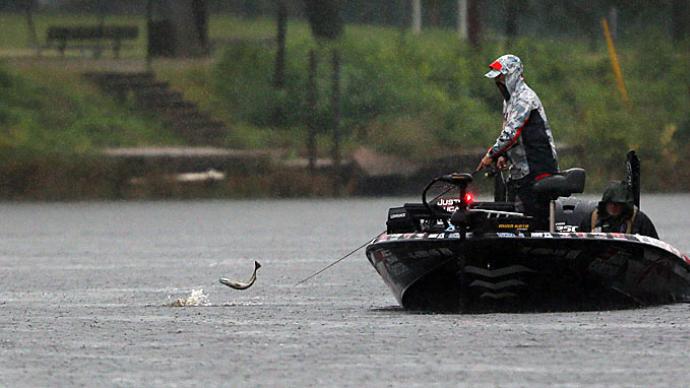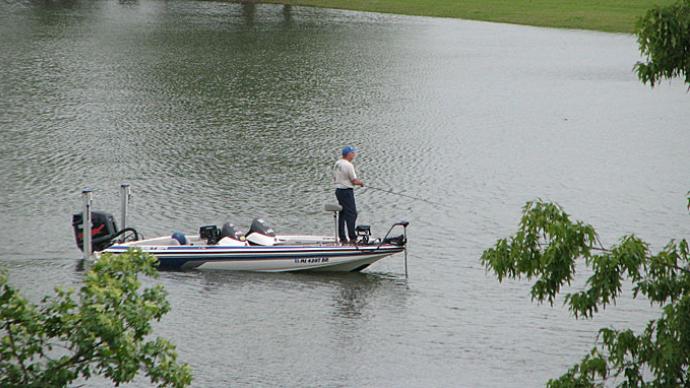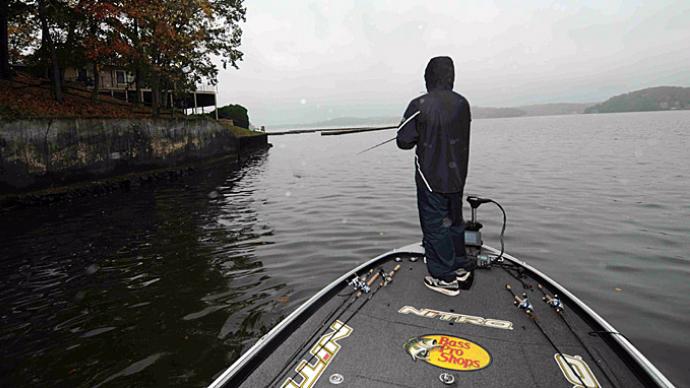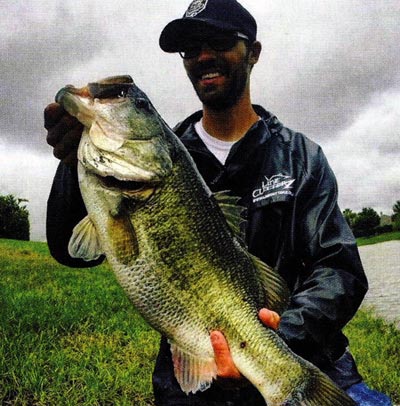
I vividly recall one of the best hours of fishing in my life. I was 16 years old, near my home in Southeast Nebraska. It was a humid summer day and it was getting increasingly cloudy. A quick glance at my phone to check the time surprised me, due to how dark the sky had gotten. It was only 3 o'clock. The wind was picking up, and the fishing was picking up even more. The wall of clouds in front of me loomed ever closer, and I will never forget the lump in my throat when the local town's tornado siren fired up.
About thirty seconds later my phone started ringing. I did not have to look to know that was my mother, absolutely terrified at the thought of me being outside fishing in the midst of a tornado warning. I knew there would be hell-to-pay for not answering that call, but at that moment, a hookset was a little more important to my teenaged self. That hookset marked the halfway point of that incredible hour of fishing. That's right, yours truly was foolish enough to keep on casting—and keep on catching for another 30 minutes. Eventually, the landowner came out to me, because HE knew there would be hell to pay from HIS wife for not getting me inside.
I knew the fishing was good, but did not really know WHY it was so good before that storm hit. Now, at the seasoned age of 26, when I look back at that day a decade ago, I'm beginning to understand why that day was so good. I've learned that the changes going on above water have a massive impact on what is going on under the water. I think many anglers notice a big storm coming and see that as an indoors day. But personally, an oncoming storm is a great fishing opportunity for me, and as pond owners, it can be a great opportunity for you as well. After all, a small pond will be affected much more than a larger body of water when a storm hits, and we can capitalize on that.
To start off, lets focus on what fishing is like in stable conditions. When there hasn't been much of a change in weather, fishing patterns become somewhat stable. Water clarity normally stabilizes. Water temperature is not about to make any sudden changes. Water level will not be rising dramatically. Sure, there will be slight temperature variations, and wind changes, but overall, the bluegill and bass behavior will be at least somewhat predictable and align with what most anglers expect for the season they are fishing.
With the onset of a storm, one of the first things to measurably change is barometric pressure, also known as atmospheric pressure. Barometric pressure begins to change well before a storm hits, and it is one of the things that impacts fishing the most. Yet, if we don't pay attention to it, we may never know it is happening. Atmospheric pressure is exactly what it sounds like—it is the pressure of the atmosphere on the Earth. When conditions are stable, pressure is normally at its highest. This means that nothing is blocking the atmosphere and its pressure from reaching the Earth (such as clouds, wind, or any stormy conditions). However, when a storm is brewing in an area, the onset of clouds, wind, and changing atmospheric currents means that the pressure is being affected. As you might imagine, the denser the clouds and the more intense the storm, the less atmospheric pressure is reaching the Earth. That means all of that pressure is being blocked by the ceiling or storm system. However, as soon as that storm passes, and a high-pressure system pushes it out, that ceiling is gone, and high-pressure resumes.
So, now that I have attempted to explain pressure, let's try to figure out why it affects fish behavior. Every game fish has an air bladder, and they use that air bladder to adjust their buoyancy. For a fish to chase forage, to spawn, to do anything, that fish needs its air bladder to regulate its position in the water column. As you can imagine, since fish use this air bladder so much, they are instinctively aware of any changes in pressure. When barometric pressure is high, fish tend to be a little more sluggish, or lethargic. The increased barometric pressure is pressing on the water, and therefore it is pressing on the fish and their air bladder. It is uncomfortable and difficult for a fish to be at its most active when this increased pressure is on its air bladder. An important biological note here—fish have the ability to adjust the pressure in their air bladders. When things are stable, fish are more likely to be static, because they don't need to adjust to pressure differences.

People often say to fish right before a storm, and there just may be something to that. Although there has seemingly been little change to water temperature, clarity, or anything else, the fish know a storm is coming. How? Dropping barometric pressure. Those fish are very skilled meteorologists. They can sense that the pressure is dropping and that change is impending. The dropping pressure means two things to the fish: 1) they need to binge, because this upcoming event is going to change the conditions of the pond; therefore, they need to feed to prepare for the unknown. And 2), since barometric pressure is dropping, they feel that decrease of pressure on their air bladder. I liken it to a weight being lifted off of those fish. You can just tell a difference in a pond when a storm is coming and the pressure is dropping, because those fish are so much more willing to chase a lure—and they hit harder. They are preparing for that storm to come, and the reason they CAN prepare for it is because that lower pressure has allowed them to be more active and to feed on what they need to prepare for the storm before their air bladders adjust.
The other ways storms affect your pond are far more obvious than the barometric pressure. Wind, water level, and water temperature are the three main things that can really change fishing rapidly in a storm. Wind can cause lethargic fish to become active, in my opinion. When wind pushes on a pond, it moves many of the smaller particles in that pond to one bank and creates counter-currents that circulate plankton, bits of vegetation, and what not. Normally, the baitfish will follow suit and move in to capitalize. And right behind them come the predatory fish. Now, a bass or a big bluegill is typically a lazy creature. They don't like to constantly change positions or use extra energy to stay in one position. The only reason they are willing to put forth any effort on a windy bank is because of food.
Fishing the windy bank ensures you are fishing for those fish that are actively feeding. If a fish is not in a feeding mode, it will not spend time on a windblown bank. One of my favorite tactics is to throw a lipless crankbait to these windy banks. All that noise in rough water will get a feeding bass's attention.
Some storms cause your water level to rise, and in most cases, I see this as a positive thing when it comes to fishing. When a fish's world is suddenly expanded, they are likely to explore it. An old firepit or a park bench can be great cover for a bass when the water level is unusually high. Often, baitfish will also feed on grass or vegetation that water now covers. Bass will not be far behind. If your one or two-acre pond rises by a foot or two, that is a lot of new territory for fish to explore, and they seem to know they don't have long before the water recedes. Some great fishing can be had by fishing this high water with spinnerbaits, crankbaits, and jigs, especially where water flows into your pond. There are suddenly a lot of new ambush points in the pond, and the fish are looking to take advantage of their new territory and new places to capture prey while it lasts.
Another great thing about rain—it can cause currents in your pond. Not all ponds, but some, have a drainage system. They have an area where water comes in and out of the pond. When a big storm hits and drops a lot of water, all of a sudden these areas can have water flowing through them, and I like to think of that as a highway for predatory fish. New water, new nutrients, worms, and all kinds of new things are entering the pond, and baitfish and predator fish alike come to check out the offering.
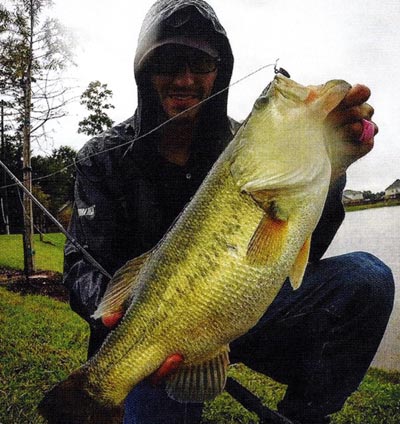
I like to sneak up on these areas of water movement and very quietly drop a jig or worm into the place where the water is rushing in or leaving the pond. Just like I mentioned above, if a fish is in or close to moving water, it is there for one simple reason: it is worth it to those fish. They are there to feed—period. During a storm, I will rush to my local pond, and fish the culverts coming into and leaving the pond, and I will almost always find a big fish sitting in the current, or in the eddy beside the current. These fish really are not too picky, because they are already on the lookout for anything that might be rushing by. This can be a great way to assess the size of the biggest bass in your pond. Fish instinctively know this is a great ambush point, and the biggest, most dominant fish will likely take her place at the most opportune spot. The great thing is, these highways often reload themselves throughout the day. If you pull a big fish out of the area, come back in an hour, and a new fish will likely have taken its place. These moving water areas, in an otherwise still pond, are PRIME real estate, and fish will be quick to take advantage of the moving water while it lasts.
A serious storm will obviously drop a fair bit of rain, and in many cases, this can affect water temperature. Some of the most killer fishing days are when a warm spring rain raises the water temperature by a few degrees. A warm spring rain can be the spark needed to really push fish out of their winter doldrums and into a pre-spawn phase. Often these fish are just waiting for that water temperature to go from 58 to 60 degrees, or depending upon the location, some other small increment. The point is, a rain can change water temperature fast. Obviously, one of the main things I think about is the air temperature as the rain is falling, but the ground temperature is important as well. If rain comes at night, when there has been no sun on the ground, the runoff will likely be colder. But if the rain comes during the day, after some sun has hit it, it can be a much warmer runoff.
In contrast, rain can also cause the water temperature of your pond to drop. I have found that a cooler, stormy summer day can really cause fish to bite. During the summer months, fish can be lethargic from the warm water. A cool rain can drop water temperature a few degrees, and those fish zip out of their deep-water summer haunts to explore the cooler, higher water the storm brought in.
If water is steadily getting warmer, a cold spring rain can push those fish off their pre-spawn staging points, and back into their winter haunts. Whereas a warm fall rain can cause fish to binge one more time before winter, and likewise, a very cold fall rain can drop the water temperature and cause those fish to push closer to their winter haunts.
I would like to end by saying that I do not condone fishing in a tornado, or any very serious storm for that matter. Many folks have called me crazy, but when I look back at past fishing, over half of the big bass I have caught have been in the high water of a storm, and in some cases, some were caught right in the thick of a storm. My advice is, next time you look out at your pond, and you see the rain hitting the surface of your waters, and you see the edges of your pond slowly creeping up the bank with the rising water, think twice about staying in—and if your spouse, parent, or any other worried person phones you, remember, you can call them back. However, you may never get another chance at that hookset.
Reprinted with permission from Pond Boss Magazine


